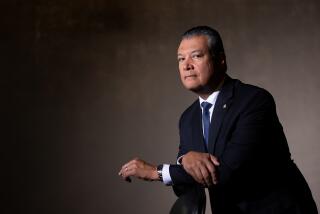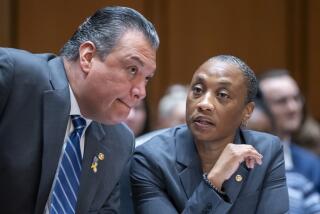Padilla guilty on all counts in terror case
- Share via
WASHINGTON — A federal jury in Miami on Thursday convicted Jose Padilla on charges of aiding terrorist operations abroad, a verdict that follows a long legal battle that pitted the Bush administration against civil liberties groups over how terrorism suspects are detained and should be prosecuted.
Padilla, a U.S. citizen arrested with fanfare in 2002 on charges that he planned to set off a radioactive “dirty bomb” in this country, was never tried on those charges. Instead, his case was combined with that of two other defendants accused of, among other things, conspiracy to murder, kidnap and maim people abroad and providing material support for terrorism.
The conviction of Padilla, 36, and two codefendants was a boost for an administration that had received sharp criticism for holding Padilla as an “enemy combatant” for 3 1/2 years without due process until the courts insisted he be charged with a crime or set free.
The three men were found guilty of all criminal charges against them. They were accused of being part of a North American support cell that operated in U.S. cities and in Canada and was designed to send money, other assets and fighters to Islamic extremists overseas.
Key government evidence was a “mujahedin data form” that Padilla filled out to join a Muslim extremist organization, as well as a statement he made embracing Osama bin Laden’s Al Qaeda network.
“We are so pleased with the verdict,” said acting Deputy Atty. Gen. Craig S. Morford. “Frankly, America is a better place today.”
U.S. District Judge Marcia G. Cooke set sentencing for Dec. 5. Padilla faces life in prison without parole.
Attorneys for Padilla, who maintained that the government did not prove its case, did not call any witnesses in his defense.
Padilla’s mother, Estela Lebron, said he would appeal. “My son would not hurt anyone,” she said. “He wanted to go there and learn his religion and the language. That is all.”
Born in Brooklyn, N.Y., Padilla grew up in Chicago under difficult circumstances and had an arrest record as a youth. He eventually moved to Florida, where he served nearly a year in jail after a road-rage incident. He was married briefly, and, in 1992, began exploring Islam. He changed his name to Abdullah al Muhajir.
His trial on terrorism charges, begun under extraordinarily high security in April, was the first significant test of a terrorist case moved from behind the shadows of Bush’s enemy combatant program and placed in the hands of a public jury. The government’s success in the Padilla case could now encourage officials to bring other enemy combatants into federal courtrooms.
“This clearly shows that in some cases, yes, the process can handle it,” Morford said. “You have to look at it on a case-by-case basis. And these particular charges did work in a regular criminal trial.”
Donna Newman of New York, Padilla’s initial attorney who fought for months just to get a lawyer-client meeting with him, agreed, saying the administration was wrong not to “trust the courts” for so long.
“I don’t necessarily agree with the verdict,” she said. But in the future, “the government should be hard-pressed to say the [criminal justice] system doesn’t work. It shows you can bring forth the evidence and try someone in court.”
But Larry Cox, executive director of Amnesty International USA, said the jury’s decision was not a blanket approval of how the administration had dealt with terrorism defendants.
“This verdict, if it stands, cannot be seen as an endorsement of a regime of unreviewable executive detention,” he said. “President Bush should not take today’s ruling as permission to continue to hold Americans outside the law at his whim.”
The White House did not signal how it might proceed on hundreds of enemy combatants, including some top Al Qaeda lieutenants housed at the U.S. naval base at Guantanamo Bay, Cuba.
Deputy White House spokesman Gordon Johndroe commended the jury and added, “Jose Padilla received a fair trial and a just verdict.”
Padilla and codefendants Adham Amin Hassoun, formerly of San Diego, and Kifah Wael Jayyousi of South Florida were convicted of conspiracy to murder, kidnap and maim individuals in foreign countries, conspiracy to provide material support to terrorists and of providing material support to terrorists.
Government testimony and evidence showed that the three raised money and provided manpower to extremist groups abroad, especially in places such as Bosnia, Chechnya and Afghanistan where Muslims were engaged in conflicts.
A key piece of the prosecution’s case was the application Padilla filled out in July 2000 to join extremists “in preparation for violent jihad training in Afghanistan.”
The government also maintained that Padilla flew to Cairo in the late 1990s and confided to colleagues that he had “entered into the area of Usama,” a presumed reference to Bin Laden in Afghanistan.
Prosecutors said Padilla often conducted his recruiting efforts in code. They said he would say “fresh air” for action in a conflict area, “tourism” for travel and expenses, and “football” for combat.
“Jose Padilla became an Al Qaeda trainee who provided the ultimate support -- himself,” Assistant U.S. Atty. Brian Frazier told the seven men and five women on the jury.
But Padilla’s defense lawyers maintained that he traveled overseas merely in pursuit of his newfound religion.
And they said he was treated inhumanely in solitary confinement for years, tortured and abused, and could not adequately assist his defense by the time the government decided to seek a grand jury indictment.
The defense also complained that Padilla was never given a fair shake by the government from the moment in spring 2002 that then-Atty. Gen. John Ashcroft went on national television and identified him as a major terrorism suspect intent on causing great harm with a dirty bomb.
“Throughout our history there have been times of crisis, times when fears run high, when political convenience causes parts of our government to overreach,” defense lawyer Anthony J. Natale told the jurors. He was referring to how Padilla was caught up in much of the anger and hysteria that followed the Sept. 11 terrorist strikes on New York and the Pentagon.
“Now is one of those times of crisis, and this is one of those cases,” Natale said.
Padilla was arrested at Chicago’s O’Hare International Airport. Ashcroft and other top administration officials said that upon returning to the United States, Padilla had planned to scope out sites for detonating a radioactive device.
The Padilla case immediately became the government’s signature front in the war on terrorism at home.
But those charges were dropped after lawyers fought for years over his legal rights, and the courts ultimately ruled that Padilla must be either granted a trial or set free.
In November 2006, Padilla was added to an indictment originally drawn up in South Florida in 2004. It was on those charges that he was convicted Thursday.
--
More to Read
Sign up for Essential California
The most important California stories and recommendations in your inbox every morning.
You may occasionally receive promotional content from the Los Angeles Times.














